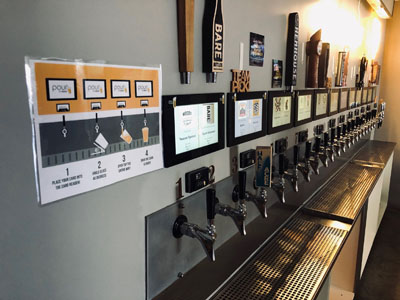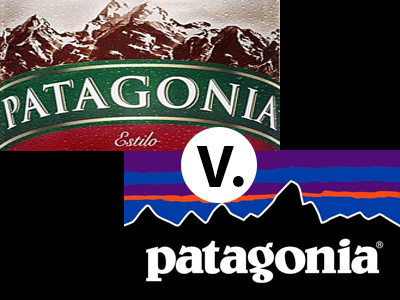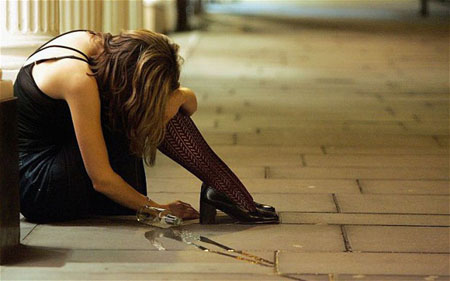In the Doghouse
Bartender-Free Bars: Less Staffing Is Less Safe
- Details
- Published: Friday, October 25 2019 09:53
 A new trend has appeared in the alcohol service market: pour-it-yourself bars. These bars allow patrons to purchase a swipe card that entitles them to pour their own beers. The strange science-fiction setup, with screens above every tap displaying what's available and how much the customer is spending, hides the fact that this style of serving brings back a very basic problem in alcohol service: how to make sure that each patron is of legal drinking age, and that they are not over-consuming. By eliminating face-to-face contact with bartenders, pour-it-yourself venues not only reduce jobs, they eliminate the people best able to make for a safer bar.
A new trend has appeared in the alcohol service market: pour-it-yourself bars. These bars allow patrons to purchase a swipe card that entitles them to pour their own beers. The strange science-fiction setup, with screens above every tap displaying what's available and how much the customer is spending, hides the fact that this style of serving brings back a very basic problem in alcohol service: how to make sure that each patron is of legal drinking age, and that they are not over-consuming. By eliminating face-to-face contact with bartenders, pour-it-yourself venues not only reduce jobs, they eliminate the people best able to make for a safer bar.In fact, California is in the middle of rolling out a mandatory responsible beverage service (RBS) training program for all alcohol servers. This program will provide staff with many of the skills necessary to promote safer consumption, including how to spot a fake ID, how to tell if a patron has drunk too much, and how to safely discourage intoxicated customers from driving. RBS is an evidence-based means to reduce alcohol harm; it stands to reason, then, that eliminating RBS-trained staff is an evidence-based ways to increase it.
That overlooks the more basic flaws in the system. Although the swipe-card makes customers interact with at least one staff member, it does not take a lot of planning to figure out how to defraud the system. Underage patrons can use a single buyer's cup, cut-off patrons can simply borrow a different swipe card, and there is no one to call a cab for a customer who is too deep in the swipes.
"These bars are dangerous, no question," said Michael Scippa, Public Affairs Director at Alcohol Justice. "They run the risk of getting a customer hurt or getting extra drunk drivers behind the wheel. And for what? To cut some jobs and make some dough? Why that's almost as dumb as extending bar hours to 3 or 4 a.m."
As Eater.com notes, pour-it-yourself systems are part of a restaurant trend towards "fast casual," where the business owner reduces overhead by eliminating as many staff positions as possible. Yet time and time again public health and safety advocates hear arguments that more liquor licenses are necessary to create jobs and help hospitality businesses stay in the black. If this quasi-futuristic concept means fewer jobs and more alcohol harm, is it a future any of us really needs?
READ MORE about the brave new world of booze.
AB InBev Tries to Fleece Patagonia
- Details
- Published: Friday, May 10 2019 15:56
Outdoor goods company sues, alleging the brew giant stole its name and logo.
 What’s in a name? If you are global megabrewer AB InBev, connotations of health, environmentalism, and earthiness. That could be why it chose to launch a new beer under the Patagonia label. Unfortunately, the positive connotations were built off the reputation of outdoor goods retailer Patagonia, famous for its fleece outerwear and dedication to social causes. Or so the latter Patagonia alleges in a lawsuit.
What’s in a name? If you are global megabrewer AB InBev, connotations of health, environmentalism, and earthiness. That could be why it chose to launch a new beer under the Patagonia label. Unfortunately, the positive connotations were built off the reputation of outdoor goods retailer Patagonia, famous for its fleece outerwear and dedication to social causes. Or so the latter Patagonia alleges in a lawsuit.
As reported in the Washington Post, Patagonia alleges in its legal filing that, “In launching its Patagonia beer, [AB InBev] deliberately has attempted to take advantage of the hard-earned reputation that Patagonia has built over the last 40 years as a company dedicated to environmental conservation.”
Certainly there is a strong resemblance. Both the beer and the gear are emblazoned with silhouetted mountain ranges, with the name written in rustic font. This potentially plays off of the customer base that the clothing manufacturer has built over the years. But it also plays into a more sinister message that AB InBev has been trying to embrace: that beer is somehow healthful.
The megabrewer has used many other strategies besides brand confusion to drive this message home. Earlier this year, they debuted nutritional labels on Bud Light. Meanwhile, their Michelob label has run extensive campaigns linking itself to exercise and workout culture. Most egregiously, AB InBev committed over $15 million to fund NIAAA’s corrupt MACH 15 study, which was specifically designed to distort the long-term effects of alcohol use to make it seem healthier. In every case, the campaigns disregard the basic health impact of alcohol itself.
“This is the same shell game that Big Alcohol has been pulling for years,” said Carson Benowitz-Fredericks, Research Manager at Alcohol Justice. “Show some snow-covered peaks and hide the tumor-riddled livers.”
Of course, the gear brand Patagonia is not above pulling the same trick. As IOGT notes, the company has its own line of beer, that likewise benefits from the company’s association with environmentalism and an outdoor lifestyle. After trying to put their own cans on the mountain, is it any surprise that Patagonia’s mountains were stolen for AB InBev’s cans?
READ MORE about the alcohol industry’s deceptive messaging around healthy drinking.
READ MORE about the corrupt MACH 15 study.
READ MORE about Michelob’s lies surrounding beer and exercise.
Third Time’s the Harm: 4 A.M. Bar Bill Back for 2019
- Details
- Published: Thursday, February 21 2019 17:58
 There is tenacity, there is stubbornness, and then there is a determination to ignore the health and wellbeing of your constituents no matter what you’ve learned. Call it “Wienerness.” In 2017, California State Sen. Scott Wiener introduced a bill to strip away California’s standardized 2 a.m. last call times. Rather than agree to study the impacts of the bill, Sen. Wiener pulled it then reintroduced it in 2018, this time as a geographically limited “pilot project”. After the senator began arbitrarily adding new cities to the “pilot,” Gov. Jerry Brown put the brakes on it with a veto.
There is tenacity, there is stubbornness, and then there is a determination to ignore the health and wellbeing of your constituents no matter what you’ve learned. Call it “Wienerness.” In 2017, California State Sen. Scott Wiener introduced a bill to strip away California’s standardized 2 a.m. last call times. Rather than agree to study the impacts of the bill, Sen. Wiener pulled it then reintroduced it in 2018, this time as a geographically limited “pilot project”. After the senator began arbitrarily adding new cities to the “pilot,” Gov. Jerry Brown put the brakes on it with a veto.
“I believe we have enough mischief from midnight to two without adding two more hours of mayhem,” the then-Governor wrote in his veto message.
And now Sen. Wiener continues his campaign of contempt for evidence-based policy. The 4 a.m. bar bill has been reintroduced for a third time, in violation of the spirit of senate rules that discourage reintroducing failed bills in consecutive sessions. The new—but functionally identical—bill, SB 58, opens up ten of the largest cities in California to late last calls. This would have the effect of dramatically raising rates of violence, injury, crime, and driving under the influence. Moreover, because the bill affects such major metropolitan areas, it creates a “splash effect,” wherein outlying towns and cities are burdened with intoxicated late-night traffic while the economic benefits accrue only in the big city centers.
“Later bar times benefit business owners while the cost of cleaning up spilled blood and splattered brains after 4 a.m. will come from public resources,” warns Bruce Lee Livingston, Executive Director/CEO of Alcohol Justice.
It is time to hold Sen. Wiener accountable for his overt lies about last call times. Decades of research from across the developed world show that maintaining a sensible last call time lessens alcohol harms. Californians need to stand up to representatives who just channel their corporate clients, and end the 4 a.m. fiasco for good.
TAKE ACTION to stop the 4 A.M. bar bill for the third time, or text "JUSTICE" to 313131
READ MORE about the harms of extending last call times
More Articles ...
Help us hold Big Alcohol accountable for the harm its products cause.
| GET ACTION ALERTS AND eNEWS |
STAY CONNECTED    |
CONTACT US 24 Belvedere St. San Rafael, CA 94901 415-456-5692 |
SUPPORT US Terms of Service & Privacy Policy |


